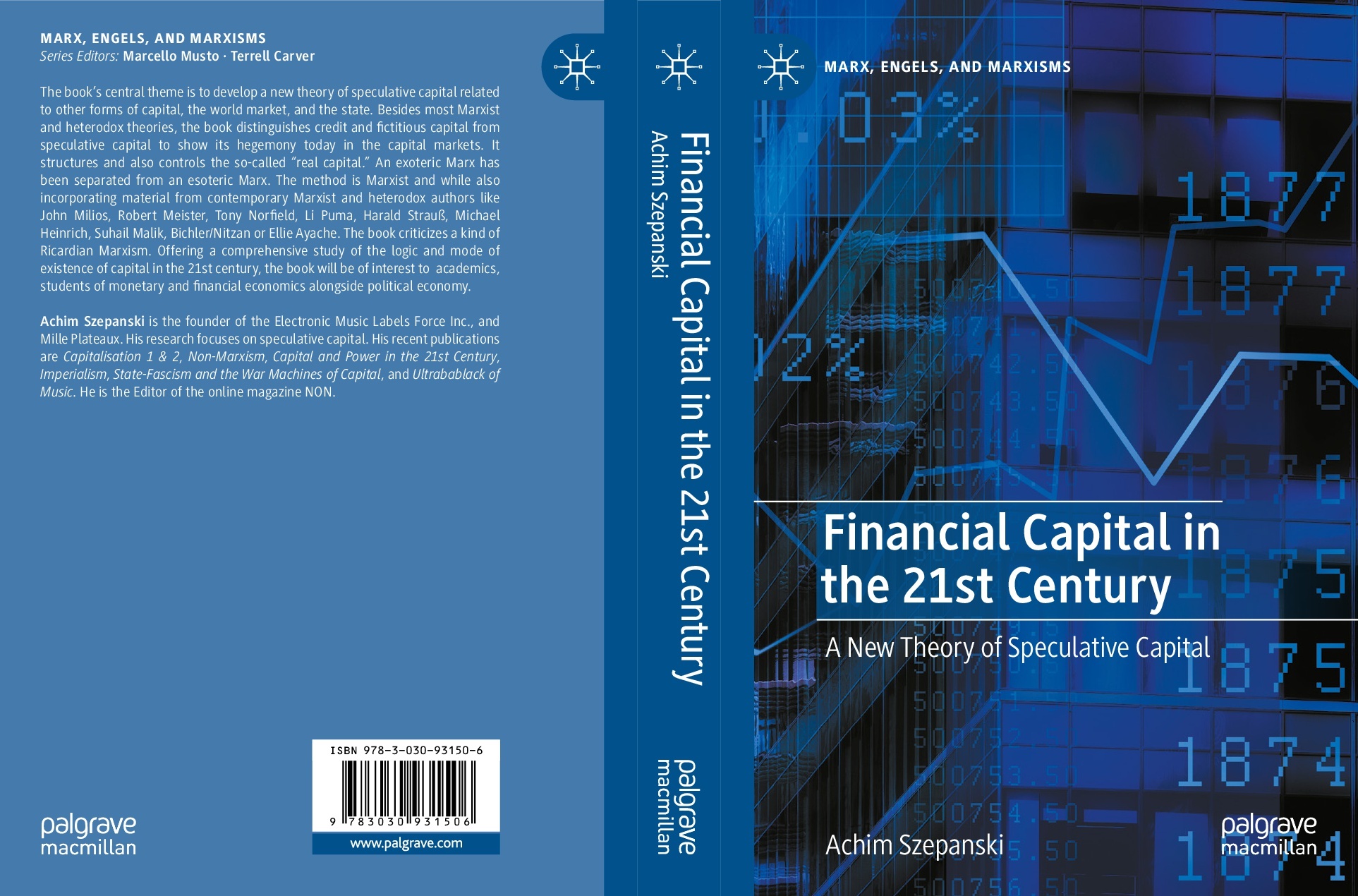you can order here
A New Theory of Speculative Capital
The book’s central theme is to develop a new theory of speculative capital related to other forms of capital, the world market, and the state. Besides most Marxist and heterodox theories, the book distinguishes credit and fictitious capital from speculative capital to show its hegemony today in the capital markets. It structures and also controls the so-called “real capital.” An exoteric Marx has been separated from an esoteric Marx. The method is Marxist and while also incorporating material from contemporary Marxist and heterodox authors like John Milios, Robert Meister, Tony Norfield, Li Puma, Harald Strauß, Michael Heinrich, Suhail Malik, Bichler/Nitzan or Ellie Ayache. The book criticizes a kind of Ricardian Marxism. Offering a comprehensive study of the logic and mode of existence of capital in the 21st century, the book will be of interest to academics, students of monetary and financial economics alongside political economy.
Achim Szepanski is the founder of the Electronic Music Labels Force Inc., and Mille Plateaux. His research focuses on speculative capital. His recent publications are Capitalisation 1 & 2, Non-Marxism, Capital and Power in the 21st Century, Imperialism, State-Fascism and the War Machines of Capital, and Ultrabablack of Music. He is the Editor of the online magazine NON.
Achim Szepanski is a mad scientist of the left, fusing ferociously heterodox political economy with equally fierce erudition and theoretical verve, drawn from a breadth of critical traditions and pointing toward a future arriving at furious velocities. As if that were not enough, he spends his spare time time translating and publishing critical contemporary thought across numerous disciplines; it seems too much for one person, and perhaps this is all the work of a revolutionary collective operating under the name — but either way the radical left is fortunate to have Achim Szepanski on its side.
Joshua Clover. Professor of Literature and Critical Theory, University of California Davis.
To understand value and its valorization, we need to understand money; to understand money, we need to understand its capitalist form; and to understand this capitalist form, we need to understand finance. Achim Szenpanski is one of the few who recaptures the whole ‘line of preconditions’ from the first and last condition: actual finance and speculative capital as a social totality. The conception is informed by different strains of radical critique and avoids the narrowing of conventional economics – towards a finance theory of value and money, power and state.
Frank Engster. Author of Das Geld als Maß, Mittel und Methode.
Achim Szepanski’s work on Marx, political economy of the present era, and his close examination of the speculative or finance economy as that apex of what has always already been present in capitalism, even in its nascent form, is a rare example of rigorous scholarship of Marx’s original oeuvre without recourse to the intermediary authority of the Marxist philosophy issuing from the foundations of the Leninist Diamat. Szepanski has promulgated the non-philosophical treatment of Marx proffered by François Laruelle, as well as other radical and heretical forms of reading Marx and materialism, not only through his writing but also through the intellectual community he has established around his outlet Non-Copyriot putting Berlin once again at the centre of the most interesting discussions in political philosophy, economy and culture stemming from a para-academic setup, and thus once again demonstrating that scholarly vigor can no longer be found in the conventional academia.
Katerina Kolozova. Professor of political philosophy at the Faculty of Media and Communications-Belgrade and co-director of the School of Materialist Research (Vienna TU /Skopje-ISSHS/Arizona State University/CIL-Eindhoven).
A brilliant contribution to present-day discussions on Marx’s value theory, money, capital and finance, highlighting the cardinal regulatory role of the financial sphere in capitalism. Achim Szepanski, following Marx’s analyses, takes finance seriously. He shows that ‘financialization’ is not a deviation from some ‘good’ industrial capitalism, or a new, ‘predatory’, method of exploitation (‘exploitation by dispossession’ etc.), a ‘bad’ exploitation as opposed to the ‘good’ exploitation by the ‘productive’ capital, but a historic development expressing the formal determinations innate in the capitalist mode of production.
Prof. John Milios. Author of The Origins of Capitalism as a Social System (Routledge 2019).
published by Palgrave in March 2022

